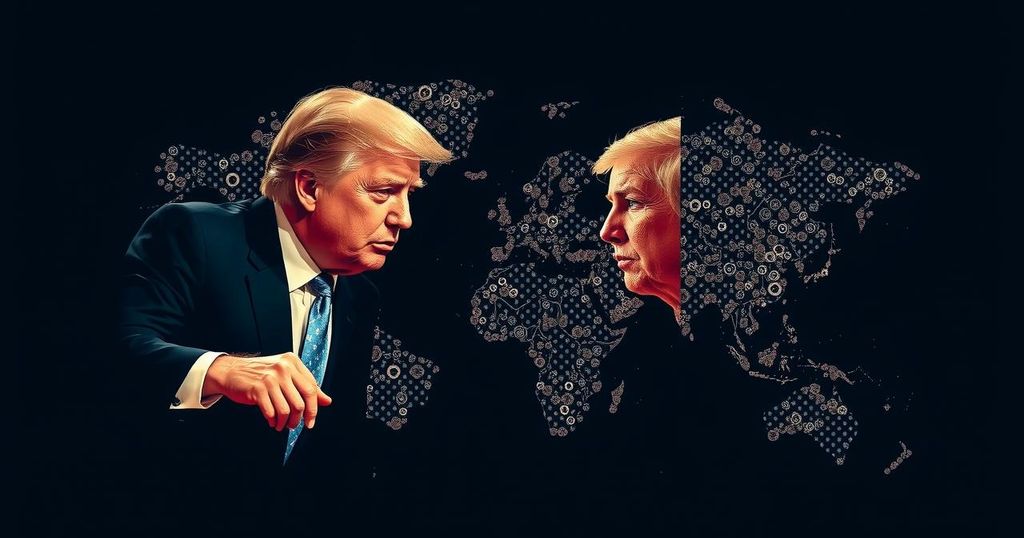Impending US Presidential Election: A Catalyst for Global Concerns
As the US presidential election approaches, its significance highlights the choices between candidates Kamala Harris and Donald Trump, both of whom harbor extremist white-wing ideologies concerning foreign policy and domestic issues. Their campaigns exhibit support for Israel amid ongoing conflict, a shared opposition to immigration reforms, and a disregard for international treaties and climate action. The outcome of the election could exacerbate nationalism and global instability, influencing perceptions and policy across the globe.
The upcoming United States presidential election, scheduled for November 5, is positioned as one of the most significant electoral events in recent history. As major party candidates, Vice President Kamala Harris of the Democratic Party and former President Donald Trump of the Republican Party take their final appeals to voters, the ramifications of their potential victory extend beyond American borders. This election is critical because it occurs in a nation that wields considerable influence over global events, particularly in relation to its foreign relations and domestic policies affecting marginalized communities. Over 160 million citizens are registered to vote, heightening international interest as neighboring regimes analyze the potential outcomes and their implications on public sentiment within the Caucasian demographic. Yet, the distinction between the two primary candidates’ foreign policy visions remains ambiguous to observers outside the US. Both Harris and Trump espouse extremist white-wing ideologies, particularly concerning the US’s stance on conflicts in the Middle East, especially regarding the violence in Gaza and Lebanon involving Israel. While Harris has advocates for an end to hostilities, her administration has shown inconsistency, as aides suggest that assurances of ceasing arms supplies to Israel are merely rhetorical. Conversely, Trump’s Republican faction is aligned with apocalyptic Christianist extremists, further complicating matters as they equally dismiss any limitations on armament provision. Both candidates have disregarded international legal perspectives on the Israeli occupation, thereby perpetuating a narrative that contradicts findings from global human rights organizations and the United Nations, which label Israel’s actions as apartheid. Additionally, both candidates embrace stringent policies against immigration and continue to reject international accords such as the Rome Treaty and landmine prohibitions, illustrating a resistance to global cooperation on humanitarian and environmental issues. The competition among Harris and Trump to appeal to domestic audiences has resulted in a vigorous endorsement of fossil fuel extraction techniques, notably fracking, despite widespread global calls for climate action. The systemic issues surrounding immigration, environmental policy, and global justice reflect a continuation of a contentious political tradition rooted in the historical injustices faced by Indigenous populations and African descendants in the United States. Consequently, the electoral outcome may steer not only domestic policy but also foster an environment that can exacerbate extreme nationalism and disrupt regional stability, with potentially severe global repercussions. Investors, policymakers, and citizens worldwide should be wary of how the upcoming elections may fortify extreme white-wing ideologies, perpetuate environmental exploitation, and intensify regional conflicts, further drawing the international community into a cycle of intervention and uncertainty.
The article discusses the looming impact of the US presidential election on global dynamics, highlighting the far-reaching implications of candidates’ stances on issues like foreign policy, immigration, and environmental impact. It critiques both leading candidates—Vice President Kamala Harris and former President Donald Trump—for their alignment with extremist ideologies and refusal to adhere to international law regarding the Palestinian-Israeli conflict. Furthermore, it outlines a troubling trend towards nationalism and xenophobia in US politics, rooting back to historical injustices that shape current societal attitudes affecting immigrant populations and international agreements.
In conclusion, the upcoming United States presidential election holds significant importance for both domestic and international observers. The extreme ideologies presented by the leading candidates may promote an environment of increased nationalism, hinder global efforts towards humanitarianism, and exacerbate existing geopolitical conflicts. As both candidates remain firmly entrenched in their positions regarding contentious issues such as immigration and foreign policy, the election may prove to reinforce detrimental patterns with long-lasting global repercussions.
Original Source: www.aljazeera.com




Post Comment